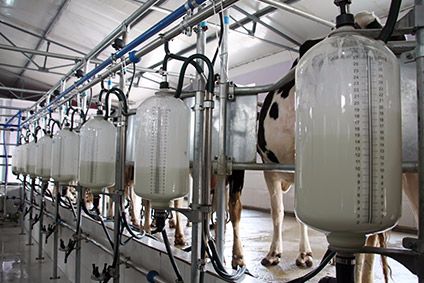
The UK plans to introduce a “statutory” code of conduct for the country’s dairy industry following consultations launched last year to ensure a fair playing field across the supply chain.
Led by the UK’s Department for Environment, Food & Rural Affairs (Defra), the consultations were farmed out in June and included England and the devolved administrations of Scotland, Wales and Northern Ireland, with the aim to establish “whether future regulation could be used to strengthen fairness and transparency”.

Discover B2B Marketing That Performs
Combine business intelligence and editorial excellence to reach engaged professionals across 36 leading media platforms.
At the time, proposals included an option to introduce a mandatory pricing mechanism within all contracts between dairy farmers and processors to “ensure the price paid for milk produced by the farmer is formally agreed within the contract, and that contract negotiations take place in a clear and transparent way”.
As a result, Defra has announced this morning (3 February) it will develop a code of conduct under the 2020 Agriculture Act, with a pledge to “increase fairness in the supply chain and help farmers become more competitive”.
“Imbalances of power within the dairy supply chain were believed to be causing instability for dairy farmers, such as where milk buyers have the ability to set and modify the terms of a contract at short notice,” Defra noted in its statement.
While acknowledging that further talks with industry players are needed to develop set standards, Defra said the statutory code will seek to establish at least minimum standards, which will also provide “businesses with the flexibility to adapt contracts to their individual circumstances”.

US Tariffs are shifting - will you react or anticipate?
Don’t let policy changes catch you off guard. Stay proactive with real-time data and expert analysis.
By GlobalDataFarming minister Victoria Prentis said: “It is only right that any contracts drawn up between farmers and processors deliver fair conditions across the board, for an industry that works hard year-round to provide the dairy products for which we are world-renowned.
“This new code of conduct will crack down on unfair practices within the supply chain, supporting the dairy sector and ensuring that our dairy farmers remain competitive as they look to the future.”
Dairy UK, a body representing the country’s dairy cooperatives and private dairy companies, which was part of the consultation process, has welcomed the move.
“We welcome the commitment made today, particularly the need for flexibility and transparency within the supply chain. We look forward to seeing more detail on the code and to working closely and constructively with Defra and the devolved administrations on how the code will translate into contract working for the industry, and to play our part in helping to ensure its successful implementation into the market,” Dr. Judith Bryans, Dairy UK’s CEO, said.
The National Farmers’ Union (NFU) provided a joint statement from dairy representatives of the four UK regions, saying: “For too long, dairy farmers have borne far too much of the risk in the dairy supply chain and inappropriate contract terms are often at the root of the problems.
“The UK farming unions have been fighting for years to change the structure of how the dairy sector operates. We want more sustainable, progressive and equitable relationships between farmers and processors, so we can collectively tackle the issues we face. This is all the more crucial as we build back from the impacts of Covid-19 and work towards new trading arrangements outside the EU.”
Defra noted passed evidence had suggested, in some cases, milk buyers had the power to set prices and modify contracts terms, often to the detriment of the dairy farmer.
“The consultation also revealed that the distinctive circumstances in Northern Ireland may need to be reflected in regulations, and this will be considered,” the statement continued.
The NFU added: “Even within the UK, there are clearly markets operating in different ways, such as Northern Ireland, and this will need to be taken in to account when designing the new code.”
Gordon Lyons, the agriculture, environment and rural affairs minister for Northern Ireland, said the consultations in his part of the world revealed there was a need for legislation, despite differences with the rest of the UK where dairy cooperatives are more prevalent.
"Given the differences between the NI and GB dairy sectors, further stakeholder engagement will be required to ensure any potential legislation would be appropriate in Northern Ireland," Lyons said. "I wish to explore the relevant issues further to inform my position on this matter. I welcome the plans for further consultation and I encourage local stakeholders to participate in this next phase of engagement."
Meanwhile, Scotland's rural economy secretary Fergus Ewing said: "We will now work to put together a new code of conduct which will increase transparency within the supply chain moving forward and enable Scottish farmers to compete more fairly in the dairy supply chain."
And the Welsh minister for the environment, energy and rural affairs, Lesley Griffiths, added: "The Welsh government has been clear if the voluntary code of best practice did not address the imbalance of power in the dairy supply chain, a legislative solution would be an alternative to ensure our dairy farmers are able to secure fair deals for their produce.
"Those within the sector have reported many contracts do not adhere to the voluntary code, and the resulting imbalance of power leads to reduced profitability for our hard-working dairy farmers, and unsustainable distribution of profits along supply chains."



